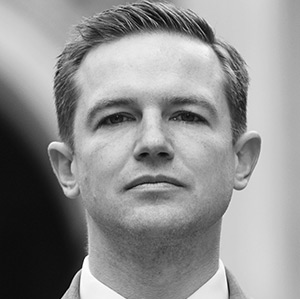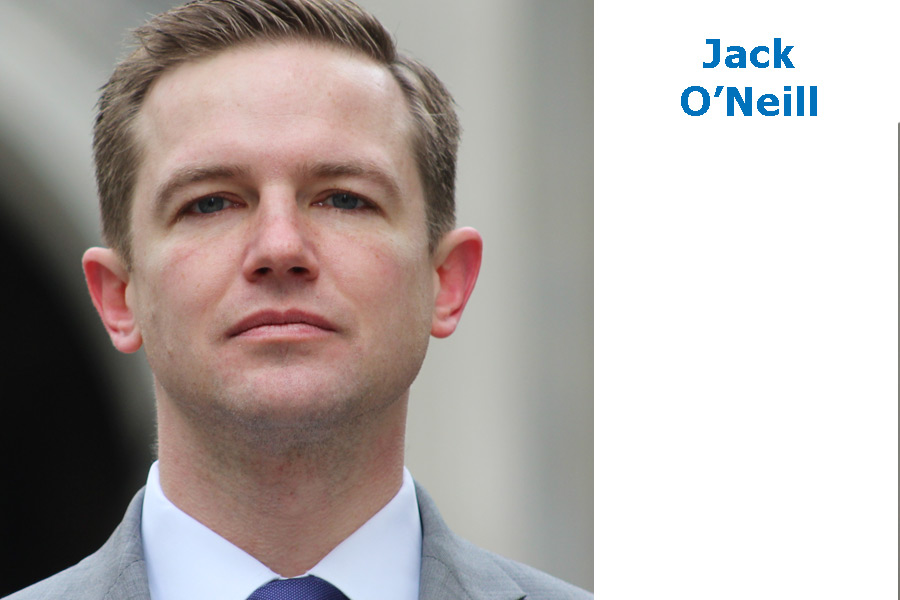Jack O’Neill prosecuted more than 100 cases involving homicide, rape and domestic violence. Before going into private practice, the district attorney candidate worked in the Juvenile Unit in the D.A.’s Office, where he represented thousands of survivors of violence and sexual assault. His victories include the high-profile sexual-assault case against Charles Finch and the Kensington rapist’s prosecution.
PGN: There have already been nine transgender women of color murdered across the nation this year. If elected, what will your office do to combat violence against transgender individuals in Philadelphia, specifically women of color?
JO: Something I have said since I started running is the first position I will appoint as the new D.A. is deputy of fair practices and equality, whose job will be to be a liaison with the LGBT community in Philadelphia. I think that will be a very effective way to address the violence that is obviously disproportionately focused on members of the LGBTQ community. The liaison would be a very effective person to start to heal the wounds and fix the lack of trust that often exists between the LGBT community — especially people who are black and brown in that community — and law enforcement. The liaison can be a direct person with a tremendous amount of power who can immediately start to address the issues. It can also make sure their DAs are not only trained and knowledgeable so they can address those issues but also stay on top of the issues to make sure they are being more proactive in places where people have felt disadvantaged and disenfranchised by law enforcement previously.

PGN: If elected, will you assist PGN in our ongoing efforts to settle all open-records litigation for access to Nizah Morris records?
JO: Absolutely. I will do it very early on in my time as district attorney. I never understood why it wasn’t turned over. I never heard a cogent or a rational explanation as to why the records haven’t been opened up especially to PGN, who I know led the charge in trying to get answers as to what’s going on there. As much as I followed that case and as much as I read about it, I’ve never heard a rational explanation as to why that information hasn’t been made available to you guys.
PGN: How would you approach racial disparities in both the charging and sentencing processes?
JO: Both can start to fix the problems with effective training. There is a deputy of training already and they would be in charge of making sure that happens. So would the deputy of fair practices and equality — to make sure the training is informed and is very in-depth as to what the causes of the racial disparity in prosecution, in arrest and sentencing are, understanding, of course, that one of the causes is the subconscious racism that exists in America, that’s often reinforced by things like the media. Training would be in-depth in addressing those issues.
PGN: What is your position on the current immigration crackdown being led by the Trump administration? What role does the D.A.’s Office play in this process?
JO: I’m absolutely against the Trump administration crackdown. I think it is xenophobic, racist and prejudice and fear mongering in a way that I hope we would never see in my lifetime. The D.A.’s Office can’t do everything to address the problems of the Trump administration but what they can do is stand up against the Trump administration. I fully support that we are a sanctuary city. One of the things that the Trump administration is trying to do is identify anyone who is suspected of being an illegal immigrant. I would do the exact opposite. I would absolutely not unless there was a threat to the community based on this person’s status. In other words, unless the person also is suspected of committing murders somewhere or suspected of something that is dangerous to people, then there is no way we would identify them to the federal government as someone who is suspected of [being] here illegally.
PGN: In light of the bribery charges facing our current district attorney, what would you do to root out corruption within the office?
JO: We would have an absolute no-gift policy. We would certainly have supervisors to keep an eye out and make sure no one is receiving gifts. There would be an absolute no-tolerance policy and if there were any gifts given, we would identify that person and punish them right away. I do think it’s important to also say that I don’t believe the acts of Seth Williams, whatever they were, should be seen to reflect on the assistant district attorneys under him. That’s not my observation of what was occurring. I think he and his personal problems are very separate from people who work for him.
PGN: Some organizations have called for the release of data on the number of people of color convicted in Philadelphia each year. Is this something you would support?
JO: Absolutely. Any data at the D.A.’s Office should absolutely be released. The things you don’t release are things that are unfair to victims and survivors. For example, I wouldn’t release personal information on victims of sexual assault. You wouldn’t release personal information on a witness to a homicide if you thought they were going to be in danger. As far as statistical information being gathered, not only would I release it to the media, I would release it to special-interest groups that are doing studies on them.
PGN: What is your position on cash bail?
JO: Cash bail should be reformed. It should be a policy of the D.A.’s Office that the D.A., at arraignment, recommends that there should be a zero-cash requirement for anybody who is not a violent offender.
PGN: What is your position on the death penalty?
JO: I’m against it in almost every case. I do, however, see a limited exception and that very-limited exception is where there’s a person who is endeavoring to kill more people as a form of retribution to prevent prosecution and where there is no other solution other than seeking the death penalty for that person.
PGN: Do you think that police violence, specifically against communities of color, is an issue in Philadelphia? If so, what would you do to combat it?
JO: There’s no question that it is. You have to have a D.A. who is able to separate themselves entirely from political pressure. You also have to collect data and turn it over so the community feels free to look at where police violence seems to be most prevalent and to communicate effectively with the D.A.’s Office. So every time there is a complaint of police violence, data from that is collected — and has been for a long time. Internal Affairs collects it and has certified records of every single police officer. What I would do that would be different is where there’s a police officer that seems to have a lot of complaints, we would investigate that thoroughly. If there were any cases where police violence were found, we would prosecute them.
PGN: The D.A.’s Office has not had an LGBT liaison since the beginning of 2015. You answered this question earlier but can you talk more about possibly resurrecting the position?
JO: As I said, I would actually make it a deputy position. The powers need to be bigger than liaison only. I think enforcing the Fair Practices Act is important. I think that pursuing equality inside the D.A.’s Office and outside the D.A.’s Office is important. Inside the D.A.’s Office, we had people feeling like they weren’t safely represented. Specifically, there were allegations of people who sent emails that were chauvinist, racist and homophobic and there were questions about whether those things were being addressed. It wouldn’t just be a liaison. It would be a deputy position with a tremendous amount of power to make sure that we would address issues in the city and inside the D.A.’s Office.
PGN: Do you support the statewide LGBT nondiscrimination bill? If yes, what would you do to advance it?
JO: It’s a bill that has a lot of facets to it but wherever the D.A.’s Office is failing to enforce things like fair practices, the deputy’s job would be to make sure it was caught immediately and that, whether there are complaints [involving] police officers, whether there are complaints inside the D.A.’s Office or just complaints in courts where there’s violations, that they are addressed immediately.
PGN: Do you support the statewide hate-crimes bill? If yes, what would you do to advance this measure?
JO: I do. Hate crimes make up an interesting legal issue. We need D.A.s who are trained from the very moment the D.A.’s Office receives a case. They need to know how to look at cases and figure out if there is a hate crime — because sometimes it’s not readily identifiable — and then ask for sentencing aggregators based on it being a hate crime. Where the motive for crime is a person’s hate — whether for their race, gender, sexual preferences, whatever it may be — absolutely should be an aggregator. If you have a person who has hate, we can all understand the rationale.
PGN: Until an LGBT-inclusive hate-crimes law is adopted, what do you think can be done to better track and report hate crimes motivated by a victim’s sexual orientation and/or gender identity?
JO: The number-one thing is that the D.A.’s Office has to be much better at showing that it’s going to be a partner, advocate and effective communicator with the LGBTQ community. So when a person experiences a threat, harassment and — God forbid — violence, they know when the police show up, they can identify the act as a hate crime right away. I know from my work as DA for a decade that there’s a lack of respect often when police are investigating crimes involving people who are members of the LGBTQ community. It needs to be immediately fixed so that a person knows that they can contact the D.A.’s Office and say whether or not they received the same respect that they would receive if they were not a member of the community; that they can identify a hate crime immediately; and if they do complain about a lack of respect or a lack of serious consideration for a hate crime, something will be done.
PGN: Why should the LGBT community vote for you?
JO: I have a long track record of standing up for the LGBT community. I, in [the Special Victims Unit], represented countless survivors of domestic assault and sexual assault. I always did so with the utmost effort to be educated on what I need to be educated on, to be understanding about everything. I always fought extremely hard for those survivors. I also advocated policies that were more effective and that were stronger in terms of addressing the issues faced by the LGBT community and the people in the LGBT community who are black and brown, and for other reasons, disadvantaged. As you know, often members of the transgender community are also members of our impoverished community in Philadelphia. These are things I take so seriously. I have since advocated for a deputy-level position whose sole purpose is to address these issues. No other candidate has taken a step that strong or anything close to it. My record of what I’ve done as a D.A. and also my platform as a candidate shows I would be the best ally for the LGBT community if I were elected D.A.
For more information about Jack O’Neill, visit www.oneillforda.com.
